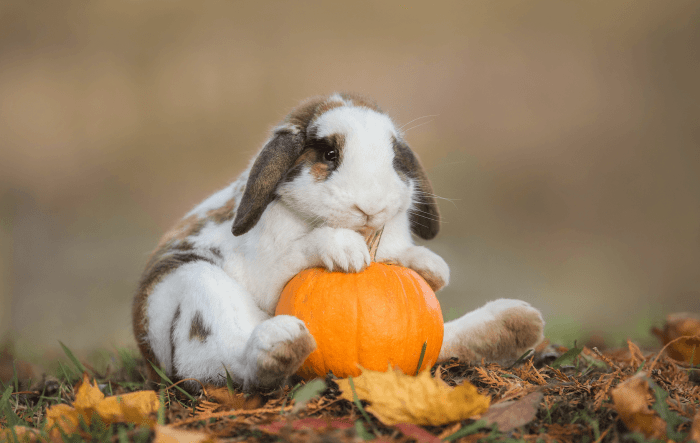Rabbits, known for their adorable nature and gentle demeanor, have unique dietary needs that must be carefully considered to ensure their well-being. Among the various fruits and vegetables that can be incorporated into their diet, pumpkins have sparked curiosity due to their nutritional value and potential health benefits.
This comprehensive guide delves into the topic of pumpkin consumption for rabbits, exploring their dietary requirements, the nutritional composition of pumpkins, and the appropriate guidelines for offering this treat to your furry friend.
As herbivores, rabbits primarily consume a diet consisting of hay, fresh vegetables, and a limited amount of fruits. Understanding the nutritional needs of rabbits is crucial for maintaining their overall health. Fruits and vegetables provide essential vitamins, minerals, and antioxidants that complement the nutrients found in hay.
Common fruits and vegetables consumed by rabbits include leafy greens, carrots, apples, and bananas, each offering a unique set of nutrients.
Dietary Needs of Rabbits
Rabbits are herbivores with unique nutritional requirements. Their diet should primarily consist of hay, which provides essential fiber for their digestive system. Additionally, rabbits require a balanced intake of fruits, vegetables, and pellets to meet their nutritional needs.
Fruits and Vegetables
Fruits and vegetables play a vital role in providing rabbits with vitamins, minerals, and antioxidants. They should be offered in limited quantities as treats, not as a primary source of nutrition.
- Suitable fruits: Apples, bananas, blueberries, strawberries
- Suitable vegetables: Carrots, celery, dandelion greens, romaine lettuce
Nutritional Value of Pumpkins
Pumpkins are not only visually appealing but also incredibly nutritious. They are a rich source of vitamins, minerals, and antioxidants that offer a plethora of health benefits.
The nutritional composition of pumpkins includes:
- Vitamin A: Pumpkins are an excellent source of vitamin A, which is essential for healthy vision, immune function, and cell growth.
- Vitamin C: Pumpkins are a good source of vitamin C, which is important for immune function, collagen production, and antioxidant protection.
- Fiber: Pumpkins are a good source of dietary fiber, which helps regulate digestion, promote satiety, and lower cholesterol levels.
- Potassium: Pumpkins are a good source of potassium, which is important for regulating blood pressure and electrolyte balance.
- Antioxidants: Pumpkins are rich in antioxidants, such as beta-carotene, lutein, and zeaxanthin, which protect cells from damage caused by free radicals.
Consuming pumpkins regularly may provide several potential health benefits, including:
- Improved vision: The high vitamin A content in pumpkins may help improve vision, especially in low-light conditions.
- Boosted immunity: The vitamins A and C in pumpkins support immune function, helping the body fight off infections.
- Reduced risk of chronic diseases: The antioxidants in pumpkins may help protect against chronic diseases such as heart disease, cancer, and age-related macular degeneration.
Consumption of Pumpkins by Rabbits
Rabbits can indeed consume pumpkins as part of their diet, as they are rich in essential nutrients and fiber. Research suggests that pumpkin flesh and seeds are safe and beneficial for rabbits in moderate amounts.
The appropriate portion size for pumpkin consumption depends on the size and age of the rabbit. A good rule of thumb is to offer a small piece of pumpkin, about the size of a golf ball, once or twice a week.
Guidelines for Preparing Pumpkins for Rabbit Consumption
To prepare pumpkins for rabbit consumption, follow these guidelines:
- Choose ripe, organic pumpkins without any signs of spoilage.
- Thoroughly wash the pumpkin to remove any dirt or debris.
- Cut the pumpkin into small pieces, removing the skin and seeds.
- Steam or boil the pumpkin pieces until they are soft and easy to chew.
- Allow the pumpkin to cool before offering it to your rabbit.
Precautions and Considerations

When offering pumpkins to rabbits, it is crucial to be mindful of potential risks and take precautions to ensure their safety. One primary concern is the high sugar content in pumpkins, which can lead to digestive issues if consumed excessively.
To minimize this risk, it is recommended to feed pumpkins in moderation and gradually introduce them into the rabbit’s diet.
Alternative Fruits and Vegetables
In addition to pumpkins, there are several other fruits and vegetables that can provide essential nutrients for rabbits. These include:
-
-*Fruits
Apples (remove seeds), bananas (small amounts), berries (blueberries, raspberries, strawberries)
-*Vegetables
Carrots, celery, dandelion greens, kale, spinach (small amounts)
By offering a variety of these fruits and vegetables, rabbit owners can ensure their pets receive a balanced and nutritious diet.
Conclusion
In conclusion, rabbits can indeed enjoy pumpkins as an occasional treat, but it is essential to adhere to the recommended portion sizes and frequency to avoid any potential health concerns. By incorporating pumpkins into your rabbit’s diet responsibly, you can provide them with a nutritious and enriching addition to their daily meals.
However, if you have any doubts or concerns, it is always advisable to consult with your veterinarian for personalized guidance on your rabbit’s specific dietary needs.
FAQs
Can rabbits eat pumpkin seeds?
Yes, pumpkin seeds are safe for rabbits to consume in moderation. They are a good source of protein and healthy fats.
How often can I give my rabbit pumpkin?
Pumpkin should be offered to rabbits as an occasional treat, not as a daily part of their diet. A small piece of pumpkin, about the size of a golf ball, once or twice a week is sufficient.
Can rabbits eat pumpkin skin?
Yes, rabbits can eat pumpkin skin, but it should be washed thoroughly to remove any pesticides or dirt.